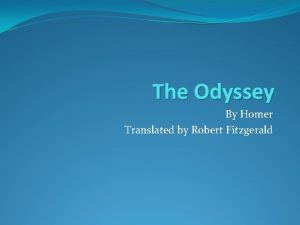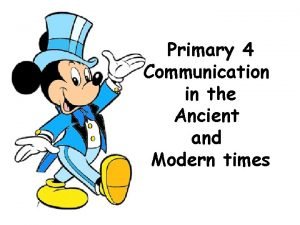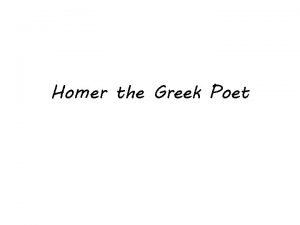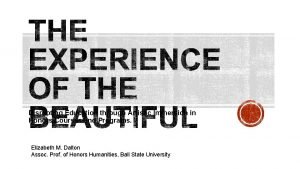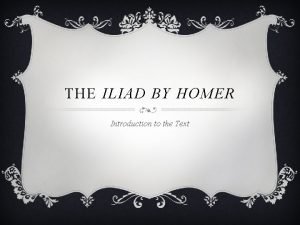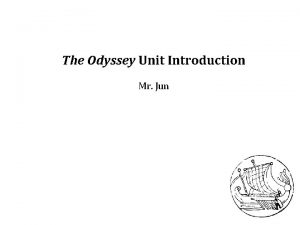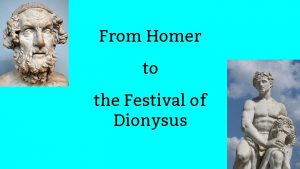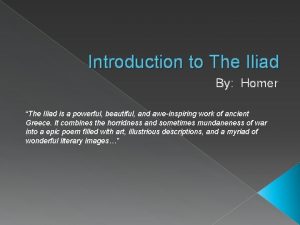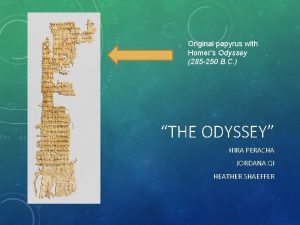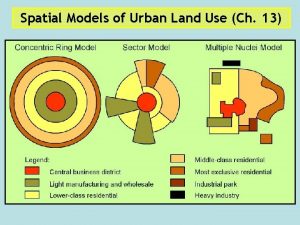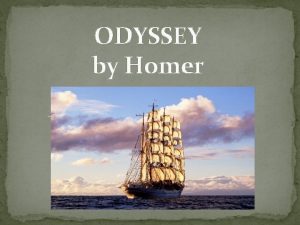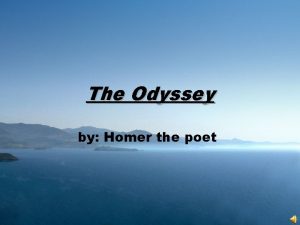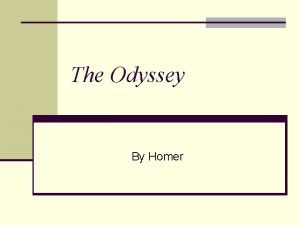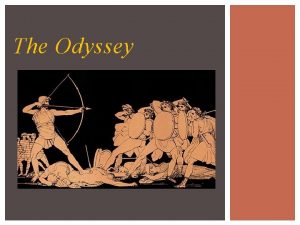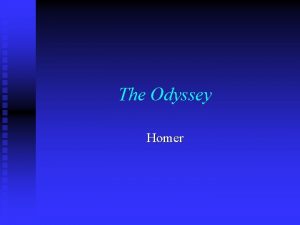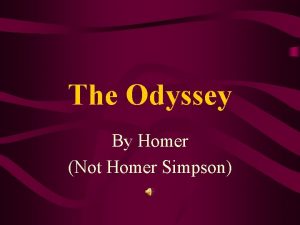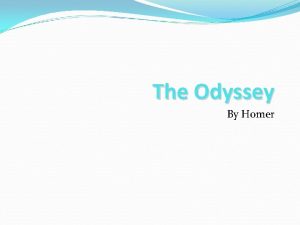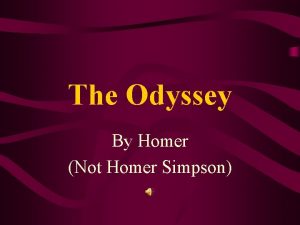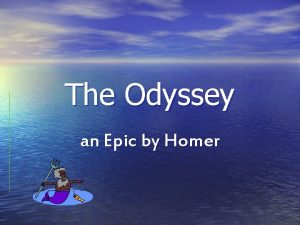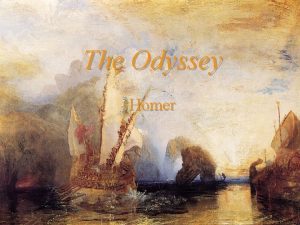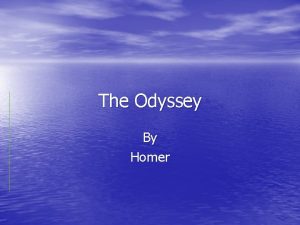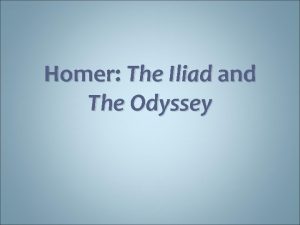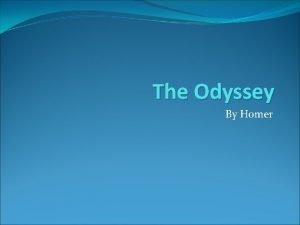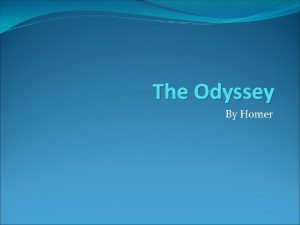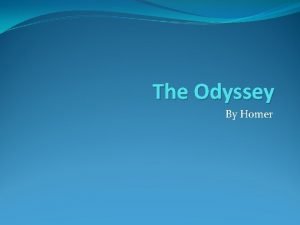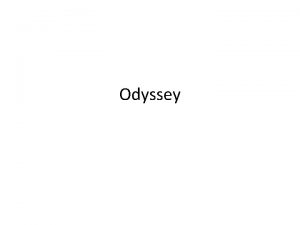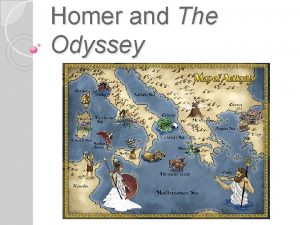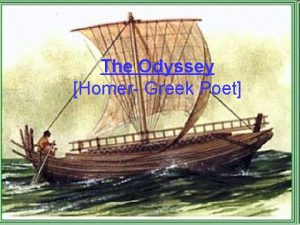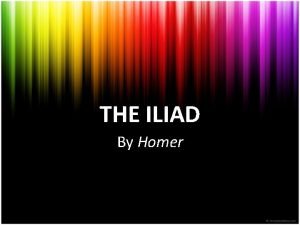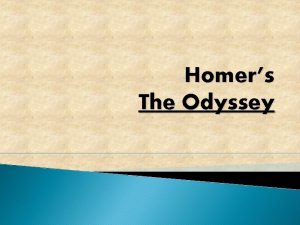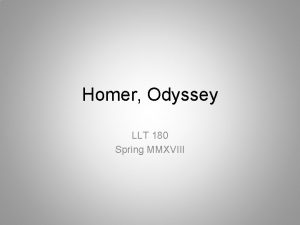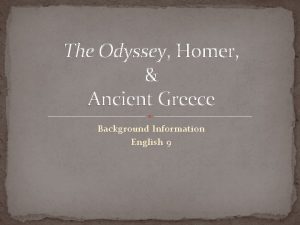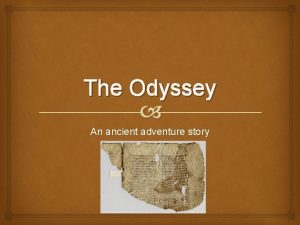The Odyssey Homer Who is Homer An ancient























































- Slides: 55

The Odyssey Homer


Who is Homer? An ancient Greek poet traditionally considered to be the composer of The Iliad and the Odyssey. According to tradition, he was blind

Where did the story come from? Over 3, 000 years ago people living in the land we call Greece were telling stories of a great war Homer is credited with gathering all of these stories and telling them as one unified epic. These great wars were called The Iliad and The Odyssey. The real stories would have taken place around 1200 B. C. (as long ago for Homer as the Pilgrims are for us!)

The Iliad Tells the story of the 10 year war fought in the city of Troy The war is said to have begun when Helen of Troy abandoned her husband Menelus ( a Greek king) for Paris ( a prince of Troy)

The Odyssey The story of the attempt of a Greek soldier, Odysseus, to get home after the Trojan war. Odysseus’ wanderings involve encounters with various monsters, enchanting women, and much more

Odysseus before the war In the years before the Trojan War, Odysseus married the beautiful and ever faithful Penelope. They had one son named: Telemachus who was still a toddler when Odysseus was called by Menelaus and Agamemnon to join them in war against Troy.

Odysseus before the war Odysseus was a homebody He didn’t want to go to war, so he pretended to be insane. He dressed as a peasant and began sowing his field with salt. Odysseus quickly displays his sanity when he avoids running his son over with the plow.

The Wooden Horse Trick Odysseus performed extremely well as a soldier and commander. It was he who thought of the famous wooden-horse trick that would lead to the downfall of Troy.

A Search for Our Place in Life Instead of beginning at the beginning, with Odysseus’ departure from Troy, the story begins with his son, Telemachus is now twenty years old. He is being threatened by powerful men who want to marry his mother. He in turn would lose his inheritance. Meanwhile, we hear that his father, Odysseus, is stranded on an island, longing to find his way back to his wife, son and home.

Relationship with the Gods Myths- are stories that use fantasy to express ideas about life that cannot be expressed easily in realistic terms. Myths are essentially religious because they are concerned with the relationship between humans and the unknown or spiritual realm.

Relationship with the Gods Homer is always concerned with the relationship between humans and gods. Homer is religious: For him, the gods control all things. Athena, the goddess of wisdom, is always at the side of Odysseus is known for his mental abilities

gods as alter-egos In Homer’s stories, a god can be an alter-ego, a reflection of hero’s best or worst qualities. The god who works against Odysseus is Poseidon, the god of the sea, who is known for arrogance and a certain brutishness. Odysseus himself can be violent and cruel, just as Poseidon is.

Epic Poem A long narrative poem about the adventures of a hero whose actions reflect ideals and values of a race or nation. Epics address universal concerns, such and good and evil Epics often include elements of myth, legend, folk tale, and history.

Epic Poem Epic poetry often begins with an “invocation, ” which is when the narrator calls on creative help to tell the story. Epic poems often begin “in media res, ” which is Latin for “in the middle of the action (story). ” This means a good part of the story has already happened and the narrator begins the poem by catching the reader up on what’s happened.

Characteristics of Epic Poetry 1. Hero is a great leader identified by a group of people 2. Setting is broad and often includes both the upper and lower worlds 3. Hero does great deeds in battle and undertakes a journey 4. Sometimes gods or other supernatural beings appear 5. Story is told in heightened language

Characteristics of Epic Poetry 6. Unusual circumstances surround the hero’s birth 7. Hero encounters “women as temptresses” who threaten his completion of the journey 8. At the end of the journey, the hero must complete a final task alone 9. After the final task is accomplished, the hero returns home, a leader of his people

Epic Hero An Epic Hero is the central figure in an epic who has superior qualities and risks personal danger to persue a grand quest.

Characteristics of an Epic Hero 1. Significant and glorified 2. Is on a quest 3. Has superior or superhuman strength, intelligence, and/or is courageous 4. Is ethical-of good moral standing 5. Risks death for glory or the greater good of society 6. Performs brave deeds 7. Is a strong and responsible leader 8. Reflects the ideals of a particular society

Characteristics of an Epic An Epics usually include action such as a quest or journey taken in search of something of value The Odyssey Odysseus is trying to return home to his wife and son.

Characteristics of an Epic An Epics include evidence of supernatural forces at work The Odyssey Greek gods, goddesses, monsters, and other characters from Greek mythology play an important role in The Odyssey

Characteristics of an Epic An Epics usually include a physically impressive hero of national or historical importance The Odyssey Odysseus is a war hero

Characteristics of an Epic An Epics usually include a vast setting involving much of the known physical world and sometimes the land of the dead as well. The Odyssey During his journey home, Odysseus travel to many locations and even visits the underworld.

Characteristics of an Epic An Epic Glorifies the hero at the end The Odyssey Odysseus restores order to his house and is welcomed home by his family.

Characteristics of an Epic An Epic The Odyssey Shows the values and culture of a specific culture and society The Odyssey reflects the beliefs and values of the culture of ancient Greece.

How were Epics told?

Poets traveled from community to community singing their stories. *Longer stories, such as The Odyssey, were probably told over a period of several days.

Epics were told orally. *They followed basic story lines and incorporated formulaic descriptions. *Most of the words were improvised to fit a particular rhythm or meter.

Homer’s Epics Homer’s Iliad and Odyssey are the best known epics in Western civilization.

The Iliad is the primary model for the epic of war.

The Odyssey is the model for the epic of the long journey home.

Many Countries have Epics England – Beowulf France – The Song of Roland Italy – The Aeneid Spain – El Cid Germany – the Nibelungenlied

The United States The U. S. has no epic. Our country is too young to have an epic, as of yet. Perhaps in a thousand years… if we last that long.

While not written this is the American Epic!

Homeric (or Heroic) Similes that compare heroic or epic events to simple and easily understandable everyday events-events the audience would recognize instantly.

People and Places Aeaea – Home of Circe, the witch- goddess

People and Places Alcinous – king of Phaeacia. Odysseus tells the story of his adventures to Alcinous’ court.

People and Places Calypso – beautiful goddess-nymph who keeps Odysseus on her island for seven years.

People and Places Charybdis – female monster who sucks in water three times a day to form a deadly whirlpool.

People and Places Cicones – people living on the southwestern coast of Thrace, who battled Odysseus and his men on their journey home.

People and Places Circe – witch- goddess who turns Odysseus’ men into swine. (pigs)

People and Places Erebus – dark area of the underworld where the dead reside

People and Places Eurylochus – one of Odysseus’ loyal crew

People and Places Lotus Eaters – people who feed Odysseus’ men with lotus plants to make them forget Ithaca

People and Places Phaeacia – island kingdom ruled by King Alcinious. The Phaeacians are shipbuilders and traders.

People and Places Polyphemus – the Cyclops blinded by Odysseus. The son of the sea god Poseidon. Cyclopes are a race of brutish one-eyed giants who live solitary lives as shepherds supposedly on the island known today as Sicily.

People and Places Syclla – female monster with six serpent heads, each head having a triple row of fangs

People and Places Sirens – sea nymph whose beautiful and mysterious music lures sailors to steer their ships towards the rocks

People and Places Tiresias – famous blind prophet from the city of Thebes. Odysseus meets him in the Land of the Dead.

People and Places Thirnakia – island where the sun god Helios keeps his cattle.

Ithaca – the people at home Antinous – one of Penelope’s leading suitors; and arrogant and mean young noble from Ithaca. Eumaeus – swinheard, one of Odysseus’ loyal servants Eurycleia – Odysseus’ old nurse Eurymachus – suitor of Penelope Eurynome – Penelope’s housekeeper Penelope – Odysseus’ faithful wife Philoeteus – cowherd, one of Odysseus’ loyal servants Telemachus – Odysseus’ son

The Gods Apollo – god of poetry, music, prophecy, medicine, and archery Athena – favorite daughter of Zeus; the great goddess of wisdom and the arts of war and peace. She favored the Greeks during the Trojan War Cronus – TITAN who ruled the universe until his son Zeus overthrew him Helios – sun god

The Gods Hephaestus – god of metalworking Hermes – messenger god Poseidon – god of the sea; brother of Zeus. Called the Earth Shaker because he is believed to cause earthquakes. Poseidon is an enemy of Odysseus. Zeus – most powerful god whose home is on Olympus.

Plot summary The Trojan war has ended Odysseus departs from Troy with a fleet of 12 ships carrying about 700 men Odysseus makes Poseidon angry with his prideful remarks Fights monsters and battles storms Encounters enchanting women who try to keep him from his wife Loses his men Goes into the underworld for advice from a blind prophet Makes it home ? ?

Conflict External Internal Pride Bragging, boasting Curiosity Hunger for fame Homesickness War Nature Gods, Goddesses Monsters Penelope’s suitors
 The odyssey by homer translated by robert fitzgerald
The odyssey by homer translated by robert fitzgerald Minoan architecture is characterized by fortified citadels.
Minoan architecture is characterized by fortified citadels. Ancient ways of communication
Ancient ways of communication Ancient india vs ancient china
Ancient india vs ancient china Cái miệng xinh xinh thế chỉ nói điều hay thôi
Cái miệng xinh xinh thế chỉ nói điều hay thôi Hình ảnh bộ gõ cơ thể búng tay
Hình ảnh bộ gõ cơ thể búng tay Cách giải mật thư tọa độ
Cách giải mật thư tọa độ Từ ngữ thể hiện lòng nhân hậu
Từ ngữ thể hiện lòng nhân hậu Tư thế ngồi viết
Tư thế ngồi viết Thẻ vin
Thẻ vin V cc
V cc Voi kéo gỗ như thế nào
Voi kéo gỗ như thế nào Thể thơ truyền thống
Thể thơ truyền thống Khi nào hổ con có thể sống độc lập
Khi nào hổ con có thể sống độc lập Thế nào là hệ số cao nhất
Thế nào là hệ số cao nhất Diễn thế sinh thái là
Diễn thế sinh thái là Vẽ hình chiếu vuông góc của vật thể sau
Vẽ hình chiếu vuông góc của vật thể sau Frameset trong html5
Frameset trong html5 Phép trừ bù
Phép trừ bù Lời thề hippocrates
Lời thề hippocrates Chụp phim tư thế worms-breton
Chụp phim tư thế worms-breton đại từ thay thế
đại từ thay thế Vẽ hình chiếu đứng bằng cạnh của vật thể
Vẽ hình chiếu đứng bằng cạnh của vật thể Quá trình desamine hóa có thể tạo ra
Quá trình desamine hóa có thể tạo ra Thế nào là mạng điện lắp đặt kiểu nổi
Thế nào là mạng điện lắp đặt kiểu nổi Khi nào hổ mẹ dạy hổ con săn mồi
Khi nào hổ mẹ dạy hổ con săn mồi Các châu lục và đại dương trên thế giới
Các châu lục và đại dương trên thế giới Dạng đột biến một nhiễm là
Dạng đột biến một nhiễm là Nguyên nhân của sự mỏi cơ sinh 8
Nguyên nhân của sự mỏi cơ sinh 8 Bổ thể
Bổ thể độ dài liên kết
độ dài liên kết Thiếu nhi thế giới liên hoan
Thiếu nhi thế giới liên hoan Chúa yêu trần thế alleluia
Chúa yêu trần thế alleluia điện thế nghỉ
điện thế nghỉ Phối cảnh
Phối cảnh Một số thể thơ truyền thống
Một số thể thơ truyền thống Trời xanh đây là của chúng ta thể thơ
Trời xanh đây là của chúng ta thể thơ Hệ hô hấp
Hệ hô hấp Công của trọng lực
Công của trọng lực So nguyen to
So nguyen to đặc điểm cơ thể của người tối cổ
đặc điểm cơ thể của người tối cổ Tỉ lệ cơ thể trẻ em
Tỉ lệ cơ thể trẻ em Các châu lục và đại dương trên thế giới
Các châu lục và đại dương trên thế giới ưu thế lai là gì
ưu thế lai là gì Môn thể thao bắt đầu bằng từ chạy
Môn thể thao bắt đầu bằng từ chạy Tư thế ngồi viết
Tư thế ngồi viết Homers life
Homers life Disrupt texts homer
Disrupt texts homer The iliad summary
The iliad summary Who is homer
Who is homer Dionysus homer
Dionysus homer Ffa 1969
Ffa 1969 A figura a seguir representa a vista frontal de homer
A figura a seguir representa a vista frontal de homer Introduction of iliad
Introduction of iliad 285-250
285-250 Hoyts sector model
Hoyts sector model
